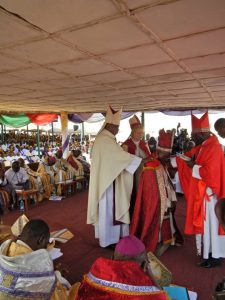By Emily Campbell
September 5, 2017 — Bishop Ann Svennungsen has traveled to Nigeria to meet with Archbishop Musa Panti Filibus, of the Lutheran Church of Christ in Nigeria (LCCN), the Minneapolis Area Synod’s companion synod. The General Secretary of Mission Africa of Denmark, another partner judicatory of the LCCN, will also be part of the conversations.

Bishop Ann Svennungsen attends the installation of LCCN Archbishop Rev. Dr. Musa Panti Filibus earlier this year.
At the prompting of Archbishop Filibus, the meeting is an opportunity for leaders to collaborate on mission work. Bishop Svennungsen explains, “This is an exciting time in our partnership. At this meeting the LCCN, Archbishop Filibus and all of the diocesan bishops will be present, as well as the general secretary from Mission Africa of Denmark, the [Lutheran World Federation] Area Secretary for Africa, two representatives from the ELCA global mission, and myself.”
Since the Minneapolis Area Synod and the LCCN formalized their relationship in 1990, leaders from both synods have traveled to learn from and help one another grow in ministry. Most recently Bishop Svennungsen traveled to attend the installation of Archbishop Filibus.
“We are not a church in isolation.”
Each synod in the ELCA is partnered with at least one other Lutheran judicatory in another country. Built around the idea of “accompaniment,” companionships are intended to strengthen ministry by exchanging prayer, learning, and leadership. The ELCA companionship program promotes “mutuality, inclusivity, vulnerability, empowerment and sustainability.” As the ELCA website states about this shared mission, “companion church relationships enrich and deepen our ministries by exposing us to global challenges and perspectives as we seek to work with one another to build up the body of Christ and the world.”
The companionship with the LCCN has repeatedly served to foster faithful connections in addressing global issues and building Christian community, according to Bishop Svennungsen.
THE RELATIONSHIP IS ONE of both learning and action. Dr. Ibrahim Bitrus exemplifies this relationship. He has served as the Minneapolis Area Synod’s Theologian-in-Residence since receiving his doctorate in systematic theology from Luther Seminary in 2015. “The companionship has not only broadened the horizon of the Lutherans in both places, but also it has given them a rare opportunity to learn from each other,” Bitrus explains. “As the two synods learn one another, they have mobilized Lutheran congregations in both countries to help strengthen their communities. A joint mission to address water and health, has “tremendously impacted the standard of living of many communities in Nigeria,” he adds.
In May, Archbishop Filibus was elected the president of the Lutheran World Federation. He stated his key priorities include gender justice, youth, diakonia (service among others), addressing human tragedy, and inter-religious relationships for peace and justice.
In an interview with the Lutheran World Federation after his election, Archbishop Filibus highlighted the importance of global accompaniment in realizing these priorities: “We have an obligation to listen to one another and support each other in these struggles. No church should be left to feel it is alone.”
As the only synod in the ELCA to have a companion synod in Nigeria, the Minneapolis Area is uniquely situated to accompany Archbishop Filibus as he works towards these goals, Bishop Svennungsen explains. The LCCN is growing and currently has 2.5 million members in more than 2,000 congregations across Nigeria. As the relationship continues to grow, the two synods will partner more closely to impact more lives in both places.
“Companion church relationships enrich and deepen our ministries by exposing us to global challenges and perspectives as we seek to work with one another to build up the body of Christ and the world.”
For Bitrus, the impact of the companionship is already salient: “The relationship between the Minneapolis and Nigerian synods has shaped my sense of Christian community profoundly. For me, Christian community is not bound by space and time; it is an unbounded relationship among diverse believers in Christ that transcends any racial and national boundaries. The relationship between the two synods bears eloquent witness to the truth we are together Christ’s interconnected single garment such that whatever affects any part of the garment impacts the entire garment. We are truly who we are as Christians only in relationship with people who are irreducible different from us. We are not a church in isolation. The partnership has reclaimed the diverse essence of the church as an all-embracing community that God intended it from foundation of the world.”
“This will be a pivotal moment for the partners to share hopes and plans for relationship building and shares mission,” agrees Bishop Svennungsen.
